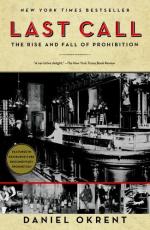|
This section contains 3,744 words (approx. 13 pages at 300 words per page) |

|
National Prohibition
Summary: National prohibition of alcohol (1920-33)--the "noble experiment"--was undertaken to reduce crime and corruption, solve social problems, reduce the tax burden created by prisons and poorhouses, and improve health and hygiene in America. The results of that experiment clearly indicate that it was a miserable failure on all counts.
National prohibition of alcohol (1920-33)--the "noble experiment"--was undertaken to reduce crime and corruption, solve social problems, reduce the tax burden created by prisons and poorhouses, and improve health and hygiene in America. The results of that experiment clearly indicate that it was a miserable failure on all counts. The evidence affirms sound economic theory, which predicts that prohibition of mutually beneficial exchanges is doomed to failure
The lessons of Prohibition remain important today. They apply not only to the debate over the war on drugs but also to the mounting efforts to drastically reduce access to alcohol and tobacco and to such issues as censorship and bans on insider trading, abortion, and gambling.
Although consumption of alcohol fell at the beginning of Prohibition, it subsequently increased. Alcohol became more dangerous to consume; crime increased and became "organized"; the court and prison systems were stretched to the...
|
This section contains 3,744 words (approx. 13 pages at 300 words per page) |

|


